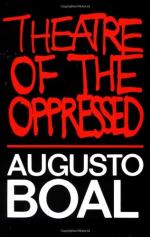|
This section contains 502 words (approx. 2 pages at 400 words per page) |

|
Chapter 1, Aristotle's Coercive System of Tragedy, Introduction through Major Arts and Minor Arts Summary and Analysis
In "Theater of the Oppressed", Augusto Boal argues that theater is inherently political and that traditional, Aristotelian theater is inherently oppressive. He reviews the history of theater, from Aristotle through Machiavelli, Hegel, and Brecht, and proposes a new idea of theater that breaks the bounds between audience and performers, and between chorus and protagonist.
In the "Introduction", Boal introduces his main proposition, that theater is inherently political. He presents conflicting classical ideas of whether the theater is merely entertainment or is fundamentally political. Aristotle argued that theater and poetry are independent of politics, and Boal seeks to show that Aristotelian theater is a political tool that represses the masses.
In "Art Imitates Nature", Boal states that Aristotle's...
|
This section contains 502 words (approx. 2 pages at 400 words per page) |

|




